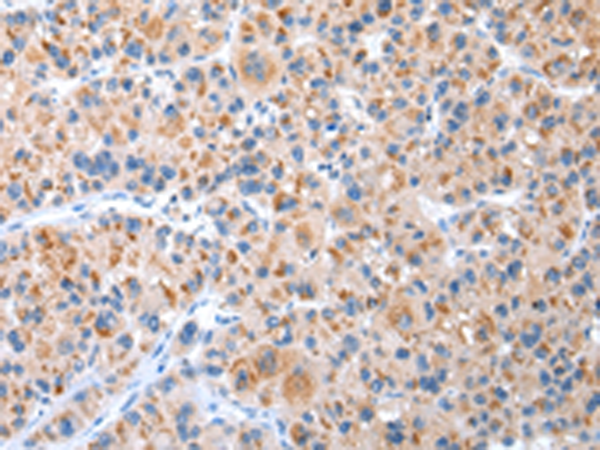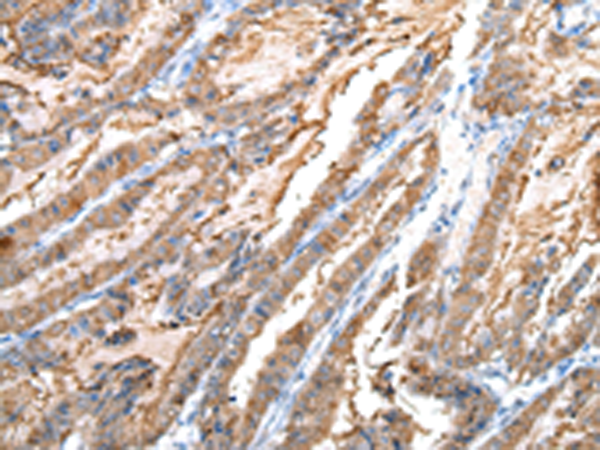

| WB | 咨询技术 | Human,Mouse,Rat |
| IF | 咨询技术 | Human,Mouse,Rat |
| IHC | 1/25-1/100 | Human,Mouse,Rat |
| ICC | 技术咨询 | Human,Mouse,Rat |
| FCM | 咨询技术 | Human,Mouse,Rat |
| Elisa | 1/2000-1/5000 | Human,Mouse,Rat |
| Aliases | FB22; HM89; LAP3; LCR1; NPYR; WHIM; CD184; LAP-3; LESTR; NPY3R; NPYRL; WHIMS; HSY3RR; NPYY3R; D2S201E |
| Host/Isotype | Rabbit IgG |
| Antibody Type | Primary antibody |
| Storage | Store at 4°C short term. Aliquot and store at -20°C long term. Avoid freeze/thaw cycles. |
| Species Reactivity | Human, Mouse, Rat |
| Immunogen | Synthetic peptide of human CXCR4 |
| Formulation | Purified antibody in PBS with 0.05% sodium azide and 50% glycerol. |
+ +
以下是关于CXCR4抗体的3篇代表性文献,涵盖结构研究、治疗应用及机制探索:
---
1. **文献名称**:*Antibody neutralization and escape by HIV-1*
**作者**:Trkola, A., et al. (2005)
**摘要**:研究HIV-1如何逃逸中和抗体(如抗CXCR4单抗12G5),揭示病毒通过受体结合域突变规避抗体阻断的机制,发表于《Nature》。
2. **文献名称**:*Structure of the human chemokine receptor CXCR4 in complex with a viral chemokine*
**作者**:Qiang, X., et al. (2017)
**摘要**:通过冷冻电镜解析CXCR4与抗体片段(如单抗表位)结合的复合物结构,阐明受体激活机制,发表于《PNAS》。
3. **文献名称**:*Targeting CXCR4 with a novel anti-CXCR4 antibody-drug conjugate for acute myeloid leukemia therapy*
**作者**:Peng, S.B., et al. (2015)
**摘要**:开发抗CXCR4抗体偶联药物(ADC),在白血病模型中显示高效靶向杀伤癌细胞并抑制转移,发表于《Leukemia》。
---
**注**:若需扩展,可补充针对肿瘤微环境调控或HIV治疗的抗体研究文献。建议通过PubMed/Google Scholar检索关键词“CXCR4 antibody therapy/structure/HIV”获取全文。
CXCR4 antibodies target the C-X-C chemokine receptor type 4 (CXCR4), a G protein-coupled receptor (GPCR) that binds stromal cell-derived factor-1 (SDF-1/CXCL12). CXCR4 plays critical roles in immune cell trafficking, stem cell homing, embryonic development, and cancer metastasis. Its dysregulation is linked to various diseases, including HIV infection, cancer progression, and autoimmune disorders. In HIV, CXCR4 acts as a co-receptor for viral entry into T-cells, making it a therapeutic target. CXCR4 antibodies are designed to block receptor activity, potentially inhibiting HIV entry or disrupting cancer cell migration and metastasis.
In oncology, CXCR4 overexpression in tumors promotes metastasis by enhancing cell adhesion to distant tissues rich in CXCL12. Antibodies like ulocuplumab (BMS-936564) have been developed to block CXCR4-CXCL12 signaling, showing promise in preclinical and clinical studies for hematologic malignancies and solid tumors. These antibodies may also enhance chemotherapy efficacy by mobilizing cancer cells from protective niches. However, challenges include managing potential immune-related toxicities and overcoming compensatory signaling pathways.
Beyond therapeutics, CXCR4 antibodies are vital research tools for studying receptor expression, trafficking, and signaling mechanisms. They aid in identifying CXCR4-positive cell populations in flow cytometry or immunohistochemistry. Current research focuses on optimizing antibody specificity, developing bispecific antibodies, and combining CXCR4 inhibition with immunotherapy or targeted therapies to improve clinical outcomes.
×